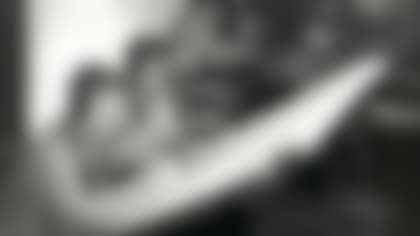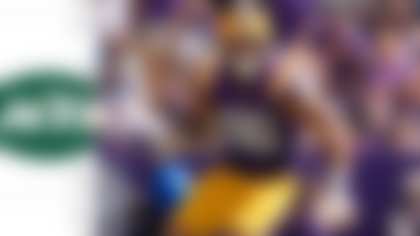The letters lay in a shoebox tucked into a corner of an attic, unbeknownst even to those who lived there: a chronicle of a young naval officer, the war, and the football team he loved.
Only many years later were the letters discovered, when the request came to recreate the desk of the late New York Giants owner Wellington Mara for an exhibit room celebrating the team's history at MetLife Stadium before it opened, along with the stadium, in 2010. Mara, a revered figure in NFL history, was a saver. In boxes at his home in the New York City suburbs were his Navy citations, report cards from his 11 children and an old baseball autographed by the New York Yankees, wrapped in tissue paper. And those letters -- hundreds of them sent to his parents and to his brother, Jack, while serving aboard the aircraft carrier USS Randolph in the South Pacific -- that relayed stories of rescues at sea, kamikaze attacks, crushing homesickness and his concerns about the Giants and the fragile league they inhabited at the time.
When the letters were discovered by one of Wellington and Ann Mara's children, Susan McDonnell, Ann Mara had one response.
"Oh, geez, your grandmother, she saved everything," McDonnell remembers her mother, who died in 2015, saying. "Let's get rid of some of this stuff."
Instead, McDonnell set them aside and only in the last few years started going through them, intent on assembling the letters for the many members of the Mara family, stopping sometimes because of how emotional the letters were. Last year, the Giants produced a mini-documentary about the letters to coincide with the NFL's 100th season. Another feature was produced this year.
When McDonnell first read the letters, she asked her older brother John, the president of the Giants, if he had known about them and the stories they contained. He had not; none of Wellington's children had heard the details of their father's life during the war. Even after he attended reunions with his fellow sailors, even when he would sometimes host some of the Navy buddies at Giants games, Mara and his friends, like many of their generation, did not talk about their experiences.
"He talked a little about friends he had made, and some of the places he had been, but he never talked about any of the battles," John Mara said. "Reading this one letter, and the kamikaze plane hit their ship -- it's mind-boggling for me, because he never mentioned that. Just the constant fear of being in danger; think about that. Having to live like that every day. I would have loved to have had conversations with him about some of these things. I wish I had. That's a big regret of mine, thinking I should have asked about it."
Wellington Mara enlisted in the Navy in November of 1941, weeks before the attack on Pearl Harbor and the United States' entry into World War II. So many players departed the NFL for service that rosters were depleted. Teams merged or suspended operations to try to survive. George Halas left the Bears in the middle of the 1942 season to join the Navy, leaving the Bears in the hands of co-coaches. The Pro Football Hall of Fame estimated that 638 men who had played in the NFL served during the war, 21 of whom died in action.
Mara was just 25 years old and already involved in running the team that was founded by his father, Tim. Less than six months of training later, Mara was commissioned as a lieutenant. He would be honorably discharged in November of 1945, with the war over. But for a year before then, Mara was a naval radar officer at sea, writing home with news that was, not surprisingly, often threaded through with football references. The letters -- some typed, some handwritten and some on the ship's stationery with a watercolor painting of the ship at sea on top -- are so clearly written in Mara's voice that McDonnell said it is like her father is speaking to her and her family.
"Ships get hit sometimes and people get hurt but the percentage is pretty small," Mara wrote in a letter from March 1945 to his parents, shortly after his ship was hit by a Japanese plane that carried a bomb. More than two dozen sailors were killed and dozens more were injured, but the ship was saved. "Being on a carrier with this gang is something like playing quarterback for the Bears used to be. If anyone or anything ever does get through to take a shot at you, he is beaten, bruised and bloody."
"The nearest thing I felt to this was when I heard the team came from behind to tie Philadelphia last year and when [halfback Bill] Paschal made that last minute run against Washington two years ago." Wellington Mara, writing about the surrender of Japan in World War II
There were commonalities to the letters, most of which were written in the later years of Mara's service. Those sent to his parents, Lizette and Tim, who founded the Giants in 1925, were more upbeat and sought to reassure them. He asked for more boxer shorts and told them, over and over, what he was eating. Lizette was protective of Wellington throughout his life. When he was a young child and had a cold, she insisted the Giants switch sides of the playing field so that Wellington could sit in the sun. When he was an adult and already married, Lizette called Wellington's wife, Ann, to find out what she was making him for breakfast. It was Lizette who kept all the letters, not just the ones Wellington sent to his family, but also letters Wellington sent to others, the recipients passing them on to Lizette to show her that Wellington was OK.
The letters to his brother, Jack, though, included more vivid descriptions of the ship and what was happening. They discussed Giants players who were also in the service, including a note from Jack to Wellington, in which he told him that Giants tackle Al Blozis, who died during the war, was missing in action in France.
Wellington would ask Jack to leave tickets to games for captains and generals he knew when they were in New York. There was one in which Wellington apologized for not writing for a few days, because he was so homesick.
"I'm just so miserable because I'm so homesick and I didn't want anybody else to be as miserable as me," he wrote.
And he wrote much more candidly of the threats faced on the ship. In February of 1945, the USS Randolph launched an air strike on Tokyo, the first of a series of strikes and air patrols launched from the carrier during its months in enemy waters. The night before the Tokyo strike, Wellington wrote a letter to his brother, Jack, that evoked the danger and fear of the moment.
"The clouds are low and there are plenty of them and they cover us like Livingston covered Hutson, like a blanket," Mara wrote. "Yesterday, the captain told the crew we were in enemy waters ... It's pretty near kickoff now and my nerves are getting a little tense. It seems as though we can surely expect something ... It all comes down to that old question, did they spot us? Tomorrow morning we will know the answer, and if they didn't, it will be tough on them. If they did, it will be tough on us, but I hope it will be tough on them, too."
Football, though, was never out of Mara's mind. There were long letters to Jack that detailed his analysis of players on the Giants' roster. There were many mentions of the Washington Football Team and the Chicago Bears, and it was clear in one letter that word had reached the ship of a loss to the Bears, which angered Mara. There were jokes about the war-induced 1943 merger of the Philadelphia Eagles and Pittsburgh Steelers, which produced a team called the Steagles, and which Wellington wrote to Jack "sounds like a vaudeville act." There were many uses of football and sports terminology to describe the work of the ship's men.
And there was concern about the start of a rival league, the All-America Football Conference. Wellington worried that three teams in New York could not survive, and that there was a risk that they would lose the Giants. He wrote to Jack, who became the team's president in 1941. "I didn't spend 3 1/2 years away from the team so that when I come home, they wouldn't be there," McDonnell recalled.
The Giants and the NFL were still there when Wellington wrote to Jack, hours after Japan surrendered on Aug. 15, 1945. He and the others on the USS Randolph had had little sleep in recent days, and they were awakened at 21:42 hours with the announcement over the public address system that the war was over.
"The nearest thing I felt to this was when I heard the team came from behind to tie Philadelphia last year and when [halfback Bill] Paschal made that last minute run against Washington two years ago," Mara wrote.
"Home alive in '45" Mara continued.
"Hoping this finds all OK and the team shaping up."













